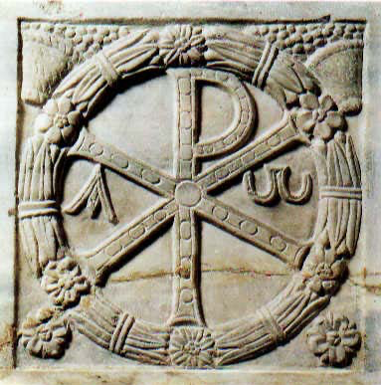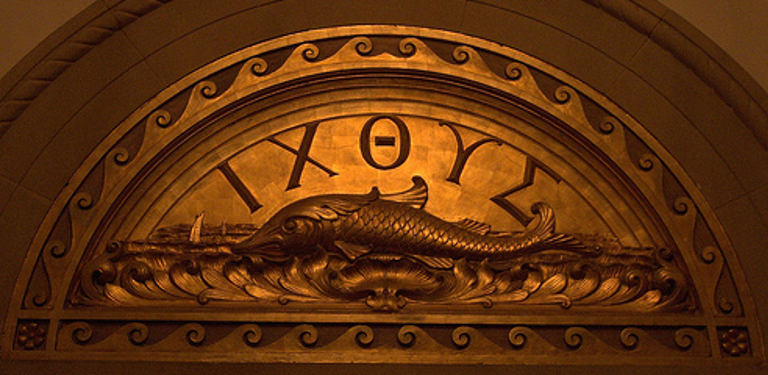Many people get bent out of shape when they see ‘Xmas’ or ‘X-Mas.’ They think it’s a way of removing Jesus Christ from Christmas. Removing Christ from Christmas happens in many direct ways, but X-Mas is not one of them. “Every year you see the signs and the bumper stickers saying, ‘Put Christ back into Christmas’ as a response to this substitution of the letter X for the name of Christ.” Nothing could be further from the truth.
Part of the problem is that most people have little historical background information related to the subject and a general ignorance of classical languages. “Christ” is a Greek word for the Hebrew word “anointed one” or “Messiah,” as in Handel’s “Messiah.”
The Greek word for Christ is Χριστος. The Greek alphabet does not have the letters “c” or “h.” You will find a “k” (kappa) and an “h” sound that looks like a single opening quotation mark that appears like this: ‘. It’s called a “rough breathing mark,” and it only appears at the beginning of words. The Greek word for “day,” ἡμέρα (heméra), is an example.
Notice that the Greek word Χριστος begins with what looks like an X, the 24th letter of the English alphabet, but it’s really the Greek letter chi = Χ.
This short lesson would be a great way to introduce your children to biblical Greek.
The late R.C. Sproul (1939-2017) writes that “the idea of X as an abbreviation for the name of Christ came into use in our culture with no intent to show any disrespect for Jesus.” Using a single letter to represent a title or name is not unusual. For example, the “R. C.” in R. C. Sproul stands for Robert Charles and is not meant to demean the man.

Worldview 101: A Biblical View of the World
Utilizing audio, video, and printed material, Worldview 101 will equip the student with the tools necessary to "think God's thoughts" about the world and the created order. It will reveal and re-direct the humanistic thought patterns that exist in each of us. The Enlightenment promised freedom, but brought slavery to man's ideas instead. Worldview 101 points the way forward to true freedom of thought in Christ.
Buy NowMost Christians are familiar with the use of the symbol of the fish as a way to represent Jesus Christ. The Greek word for fish in Greek is iχθύς (lower case letters) and ΊΧΘΥΣ (upper case letters). Each letter represents a Greek word that in abbreviated form describes the redemptive and relational work of Jesus: Ίησοῦς Χριστός Θεοῦ Υἱός Σωτήρ: (’Iēsous Christos Theou Yios Sōtēr) = “Jesus Christ, Son of God, Savior” or “Jesus Christ, God, Son, Savior.”
“The early Christians would take the first letter of each of those words and put those letters together to spell the Greek word for fish. That’s how the symbol of the fish became the universal symbol of Christendom,” Sproul writes.
Consider the use of X and P (the r sound in Greek) = Chi Rho. The Χ (Chi), as we’ve seen, is an abbreviation for Christ representing the first letter in the word Χριστός, and the letter “P” (Rho) represents the second letter in upper case form. What looks like a “P” to us is actually the Greek letter for “R.”
The Chi-Rho is common in Christian art and worship. In many of the examples you will also find the use of A and W, the first and last letters of the Greek alphabet, Alpha and Omega (Ἄλφα καὶ τὸ Ὦ: Rev. 1:8; 21:6; 22:13; Isa. 41:4), also descriptive of Jesus, and found to the left and right of the XP below:

The following is from “A Word in Edgewise” by David Capes:
“Earliest versions of writing Christmas as ‘Xmas’ in English go back to the Anglo-Saxon Chronicle (about 1100). This predates the rise of secularism by over 600 years. The Oxford English Dictionary cites the use of ‘X’- for ‘Christ’ as early as 1485. In one manuscript (1551) Christmas is written as ‘X’temmas.’ English writers from Lord Byron (1811) to Samuel Coleridge (1801) to Lewis Carroll (1864) used the spelling we are familiar with today, Xmas.’
“The origin of ‘Xmas’ does not lie in secularists who are trying to take Christ out of Christmas, but in ancient scribal practices adopted to safeguard the divine name and signal respect for it. . . . No doubt some people today use the abbreviated form to disregard the Christian focus of the holy-day, but the background tells a different story, a story of faithful men and women showing the deep respect they have for Jesus at this time of year.”
So don’t be alarmed and disgruntled when you see Xmas. If the topic comes up in a discussion, do a little “Did you know….”
Of course, for those who believe celebrating the birth of Jesus is a pagan ritual, none of the above counts. It’s important to note that the celebration of the birth of the Messiah has been corrupted and transformed into a gift-giving practice commercialized around a mythical figure named “Santa Clause” or St. Nick. Like the meaning of X-Mas, that’s some interesting history to delve into.
Santa Claus is often wrongly associated with pagan characters; he is in fact based on the very real Saint Nicholas, a monk who traveled the known world around 280 AD, giving away his wealth and helping children in need. His good deeds became legendary and by the Renaissance he was the most popular saint in Europe. His feast day was celebrated on the day of his death (December 6th), and it was common practice to buy large gifts or get married around this time every year.
The name “Santa Claus” comes from the Dutch, who first brought the celebration of Nicholas over to the American colonies in the 1700s. They called him “Sinter Klaas”, [see the film Miracle on 34th Street] short for Saint Nicholas. And, if you look at some of the very old fresco paintings of Saint Nicholas you’ll find he looks rather similar to the modern day folk character version of Santa Claus. (Source)

Restoring the Foundation of Civilization
The main reason anti-Christian civilizationists survive and seem to thrive is that Christians have not engaged with, answered, and built a competing alternative culture—THE ORIGINAL CIVILIZATION—founded on the principles found in God’s Word and observable in creation.
Buy Now
